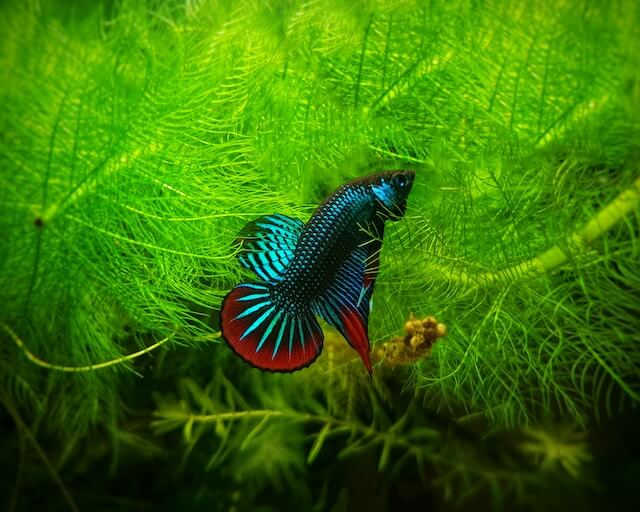Table of Contents
If you’re a Betta fish owner, you may have wondered whether your fish will eat other fish. The answer to this question is yes, Betta fish can eat other fish. Betta fish are known for their aggressive behavior, and they are territorial creatures that will defend their space against other fish. If you’re planning to keep Betta fish with other fish, it’s important to choose the right tank mates to avoid any conflict.
While Betta fish can eat other fish, it’s important to note that not all Betta fish will exhibit this behavior. Some Betta fish are more docile than others, and they may not be inclined to attack other fish in their tank.
However, it’s a good idea to assume that your Betta fish will be aggressive and choose tank mates accordingly. It’s also important to provide your Betta fish with plenty of space and hiding places to reduce the likelihood of aggression. In the next section, we’ll take a closer look at the types of fish that can coexist with Betta fish.
Betta Fish Basics
Betta fish, also known as Siamese fighting fish, are freshwater fish that are native to Southeast Asia. They are known for their bright colors and flowing fins, which make them a popular choice for aquarium enthusiasts.
Betta fish are carnivorous and primarily eat insects, larvae, and small crustaceans in the wild. In captivity, they can be nourished with a diversity of foods, including pellets, flakes, and frozen foods such as brine shrimp and bloodworms.
It’s important to note that betta fish are solitary creatures and should not be kept with other fish, especially those with long, flowing fins. Betta fish are known to be aggressive and may attack other fish in their tank.
When it comes to feeding, it’s important to not overfeed your betta fish. They have a tendency to overeat and can become obese, leading to health issues. A good rule of thumb is to feed your betta fish small amounts two to three times a day.
Dietary Habits of Betta Fish
Betta fish are carnivores and predominantly consume insects, small crustaceans, and zooplankton in their natural habitat. In confinement, they can be nourished with a variety of commercially available foods, such as pellets, flakes, and frozen or live foods.
It is crucial to acknowledge that betta fish are solitary and territorial, and may exhibit aggression towards other fish in the same tank. Hence, it is not advisable to accommodate betta fish with other species of fish, as they may attack and consume them.
In terms of feeding frequency, it is recommended to feed adult betta fish once or twice a day, while juvenile betta fish should be fed more frequently, up to three times a day. Overfeeding should be avoided, as it can lead to obesity and other health problems.
Some betta fish may also enjoy snacking on live plants, so it is important to provide them with appropriate vegetation in their tank. It is recommended to research and provide a balanced diet for your betta fish to ensure their optimal health and well-being.
Understanding Betta Fish Aggression
Betta fish, also known as Siamese fighting fish, can be aggressive towards other fish. It’s important to understand the reasons behind this behavior to ensure the safety and well-being of your fish.
Aggression Towards Other Fish
Betta fish are territorial and may become aggressive towards other fish that they perceive as a threat to their territory. This can happen when introducing a new fish to the tank, or if the betta fish feels that its space is being invaded.
It’s important to choose tank mates that are compatible with betta fish. Avoid keeping fish that are similar in appearance or behavior to betta fish, as this can trigger aggression. Additionally, make sure the tank is large enough to provide adequate space for all fish to establish their own territory.
Aggression Towards the Same Species
Betta fish may also become aggressive towards other betta fish, particularly males. This behavior is known as “fin nipping” and can result in serious injury or death.
To avoid this, it is crucial to accommodate only one male betta fish in a tank. Female betta fish can coexist in groups of three or more, provided that there is sufficient space and hiding spots for each fish.
Betta Fish and Cannibalism
Betta fish are known to be aggressive and territorial, which can lead to cannibalism. However, this behavior is not common in betta fish and is usually only seen in certain situations.
One situation where cannibalism may occur is when a male betta fish is trying to establish dominance over a new territory. If another male betta fish is present in the territory, the dominant male may attack and kill the other male.
Another situation where cannibalism may occur is when there is a shortage of food. Betta fish are carnivorous and will eat other fish if they are hungry enough. However, this is not a common occurrence as betta fish can survive for weeks without food.
It is important to note that cannibalism is not a normal behavior for betta fish and should not be encouraged or promoted. It is important to provide betta fish with a suitable environment and adequate food to prevent this behavior from occurring.
Preventing Aggression and Cannibalism in Betta Fish
Betta fish are known for their aggressive behavior, which can lead to cannibalism. However, there are steps you can take to prevent this behavior and ensure your betta fish live peacefully with other fish in the same tank.
Tank Setup
The first step in preventing aggression and cannibalism in betta fish is to set up the tank properly. Bettas need plenty of space to swim, hide, and establish their territory. A tank that is too small can cause stress and aggression in bettas.
When setting up the tank, provide plenty of hiding places such as plants, rocks, and caves. This will allow your betta to establish its territory and reduce the chances of aggression towards other fish.
It is also important to choose tank mates carefully. Avoid adding fish that are known to be aggressive or have long, flowing fins that may trigger aggressive behavior in your betta. Additionally, avoid adding fish that are smaller than your betta, as they may be seen as prey.
Proper Feeding
Proper feeding is another important factor in preventing aggression and cannibalism in betta fish. Overfeeding can cause your betta to become aggressive and territorial, while underfeeding can lead to cannibalism.
Feed your betta small amounts of food two to three times a day. Betta fish are carnivorous and require a diet high in protein. You can nourish your betta with a diversity of foods, including pellets, frozen or live brine shrimp, and bloodworms.
It is important to avoid feeding your betta live fish as this can lead to cannibalism. Live fish may also carry diseases that can be harmful to your betta.
Betta Fish Compatibility with Other Species
When it comes to keeping betta fish with other species, it’s important to choose tank mates that are compatible with their temperament and needs. While betta fish are known for their aggressive behavior, they can coexist with certain species under the right conditions.
Some compatible species to consider adding to a betta fish tank include:
- Neon tetras
- Corydoras catfish
- Ghost shrimp
- Snails
It’s important to note that while these species can coexist with betta fish, there are still risks involved. Betta fish may still exhibit aggressive behavior towards these species, especially if they feel threatened or if there isn’t enough space in the tank.
When selecting tank mates for your betta fish, it is crucial to take into account the tank size, the number of fish, and the compatibility of the species. Adding too many fish to a small tank can cause stress and aggression, so it’s important to provide enough space for each species to thrive.
Overall, while betta fish can coexist with other species, it’s important to carefully choose tank mates and monitor their behavior to ensure a peaceful and healthy environment for all species involved.







